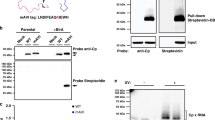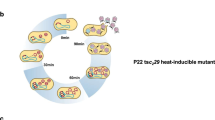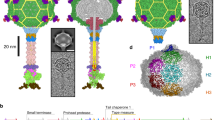Abstract
Previously we have developed an in vitro system that synthesizes infectious single-stranded (ss) DNA bacteriophage ΦX174 from purified phage components1. This system provides an assay to examine the function of each viral component in the phage synthesizing reaction. In this report, we show that the specificity of the template DNA for the phage synthesizing reaction is determined by the specific region of ΦX174 genome. Plasmid DNAs carrying the origin of ss DNA synthesis of ΦX174 are active as templates in the in vitro system and produce particles containing ss plasmid DNA packaged into ΦX174 capsids. The orientation of the ΦX174 DNA fragment carrying the origin determines which strand of the plasmid is packaged. The particles synthesized in vitro are infectious to ΦX174-sensitive Escherichia coli and introduce ss plasmid DNA into the host cells. The ss DNA is converted to ds plasmid which is maintained in the cell.
This is a preview of subscription content, access via your institution
Access options
Subscribe to this journal
Receive 51 print issues and online access
$199.00 per year
only $3.90 per issue
Buy this article
- Purchase on Springer Link
- Instant access to full article PDF
Prices may be subject to local taxes which are calculated during checkout
Similar content being viewed by others
References
Aoyama, A., Hamatake, R. K. & Hayashi, M. Proc. natn. Acad. Sci. U.S.A. 78, 7285–7289 (1981).
Dressler, D., Hourcade, D., Koths, K. & Sims, J. in The Single-Stranded DNA Phages (eds Denhardt, D. T., Dressler, D. & Ray, D. S.) 187–214 (Cold Spring Harbor Laboratory, Cold Spring Harbor, New York, 1978).
Hayashi, M. in The Single-Stranded DNA Phages (eds Denhardt, D. T., Dressler, D. & Ray, D. S.) 531–547 (Cold Spring Harbor Laboratory, Cold Spring Harbor, New York, 1978).
Eisenberg, S., Griffith, J. & Kornberg, A. Proc. natn. Acad. Sci. U.S.A. 74, 3198–3202 (1977).
Langeveld, S. A., van Mansfield, A. D. M., Baas, P. D., Jansz, H. S., van Arkel, G. A. & Weisbeek, P. J. Nature 271, 417–420 (1978).
Fujisawa, H. & Hayashi, M. J. Virol. 19, 417–424 (1976).
Chang, A. C. Y. & Cohen, S. N. J. Bact. 134, 1141–1156 (1978).
Sanger, F. et al. Nature 265, 687–695 (1977).
Birnboim, H. C. & Doly, J. Nucleic Acids Research 7, 1513–1523 (1979).
Mandell, J. D. & Hershey, A. D. Analyt. Biochem. 1, 66–77 (1960).
Guthrie, G. D. & Sinsheimer, R. L. Biochim. biophys. Acta 72, 290–297 (1963).
Davis, R. W., Botstein, D. & Roth, J. R. in Advanced Bacterial Genetics, 148–152 (Cold Spring Harbor Laboratory, Cold Spring Harbor, New York, 1980).
Author information
Authors and Affiliations
Rights and permissions
About this article
Cite this article
Aoyama, A., Hayashi, M. In vitro packaging of plasmid DNAs into ΦX174 bacteriophage capsid. Nature 297, 704–706 (1982). https://doi.org/10.1038/297704a0
Received:
Accepted:
Issue Date:
DOI: https://doi.org/10.1038/297704a0
Comments
By submitting a comment you agree to abide by our Terms and Community Guidelines. If you find something abusive or that does not comply with our terms or guidelines please flag it as inappropriate.



